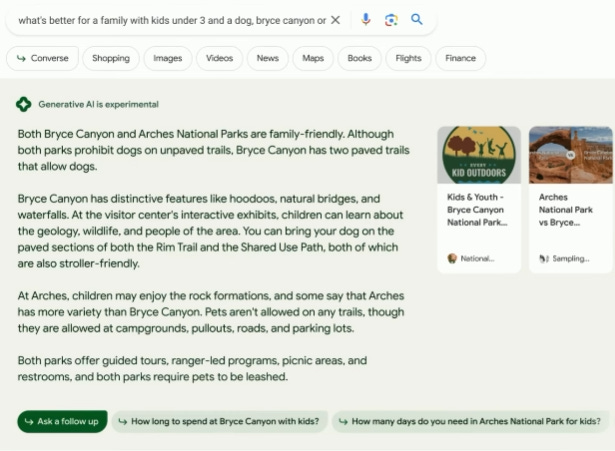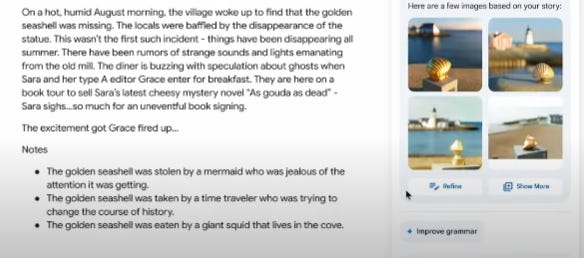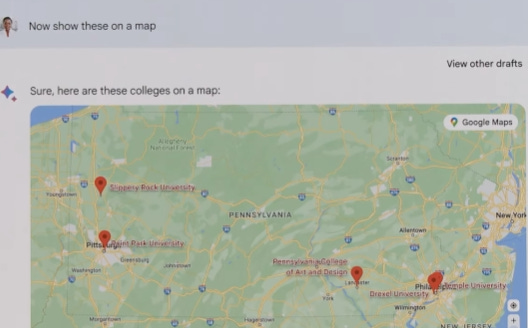Turns Out, Google Isn't That Far Behind In AI...
This years keynote was a huge step forward for Google. They released a lot new AI tools, like a Copilot competitor, an email AI, Google photos AI and much much more.
Introduction
In a testament to the growing influence of artificial intelligence, Google's I/O 2023 developer conference was an AI showcase, with updates from a variety of its apps and services. The tech giant is leaning further into AI, demonstrating its intent to remain at the forefront of this transformative technology.
AI-Infused Google Search
Google announced a groundbreaking update to its search engine, incorporating AI-generated text summaries in response to user queries. This experimental feature, reminiscent of the capabilities of ChatGPT, will provide brief, AI-generated summaries of web content above the traditional links and ads. Whether you're seeking information about Britain's latest coronation or ebike reviews, the AI will create handy summaries or bullet-point takeaways from various websites, revolutionizing how information is consumed on the internet. Instead of broad searches followed by manual digging, the AI will understand more specific questions and conduct research on your behalf. The AI will also categorize the sources based on the specific type of information they provide, offering a more streamlined and efficient search experience.
Android: Supercharged with AI
Android, the usual star of I/O events, received notable updates 80 minutes into the conference. The focus was not just on cosmetic settings and privacy enhancements, but also on the integration of AI capabilities. One notable feature was AI wallpapers, which allow users to transform photos into different art styles and create interactive, moving backgrounds.
Google is also integrating the capabilities of its Bard chatbot into Android messaging, allowing users to ask questions directly in the chat box and modify their message syntax to suit different conversational tones.
Workspace Transformed by AI
Google is also infusing AI into Workspace apps like Google Docs, Sheets, and Slides with Duet AI. This tool uses generative AI to create job descriptions, write creative stories, generate spreadsheets, and even suggest text for slides. This update, positioned as a competitor to Microsoft's 365 Copilot, will soon be available to consumers.
Google Docs:
(AI generated images inside google docs)
Google Sheets:
Google Slides:
(AI generated images also right inside slides)
The Magic Editor: Mobile Photoshop Redefined
Google’s photo-editing feature Magic Eraser is being updated to become the Magic Editor, turning it into a mobile version of Photoshop. The Magic Editor allows users to edit almost every aspect of a photo, from adjusting lighting to removing unwanted elements and even repositioning subjects within the frame. The potential for photo manipulation is immense, and Google will watermark images that were entirely computer-generated.
Gmail and AI: A Perfect Match
Gmail is set to receive a feature called Help Me Write. This AI-powered tool can create entire replies, adding context from previous emails. Users can customize the complexity of the replies and review them before sending. It’s like ChatGPT but perfected for emails.
Google Maps: AI-Powered Immersive View
Google Maps is set to get an AI upgrade with Immersive View for routes. Users will be able to simulate their route in 3D, viewing landmarks along the way. The AI will also predict traffic volumes and display the current weather. This feature will be available in 15 cities, including New York, San Francisco, London, and Tokyo, later this year.
Google Photos and the Magic Editor
Google Photos is getting an AI-powered Magic Editor, capable of removing unwanted elements, repositioning subjects, and even recreating parts of an image that were cropped out. This advanced editing tool promises to change how we interact with our photos.
Google Bard: A huge update
The waitlist for Google's AI chatbot, Bard, is going away. Soon, anyone can chat with this AI, which will also be available in Japanese, Korean, and 40 other languages. Bard is also getting new features, like generating spreadsheets based on specific criteria, and creating images in collaboration with Adobe. Bard has also learned over 20 programming languages, such as python, c#, c++ and even Google Sheets functions. Bard will also have the ability to see images and determine what’s happening in them, making it multi modal. And if that wasn’t enough, bard can also see locations near you and plan routes for you in a map visualization by using google maps as a sort of plugin. This is a huge step forward for google as they fight against OpenAI’s ChatGPT.
Googles Answer To Copilot
At its annual I/O developer conference, Google announced the introduction of a slew of AI-centric coding tools, signaling a new era in developer experience. These tools include Codey, Google's answer to GitHub's Copilot, a chat tool designed to answer coding and Google Cloud-related queries, and AI-assisted coding for Google's no-code AppSheet product.
The heart of these novel code completion and code generation tools is Codey. Built on Google’s advanced PaLM 2 large language model, Codey has been specifically trained to manage coding-related prompts, alongside general queries related to Google Cloud. This falls under Google's Duet AI initiative.
The model was trained on a vast corpus of permissively licensed open-source code, internal Google code, all of the company’s code samples, and its reference applications. This provides developers with a robust and comprehensive tool for code generation and completion.
Developers can access these new tools via an extension for Visual Studio Code, JetBrains IDEs, the Google Shell Editor, and Google’s cloud-hosted Workstations service. While the model was trained in the context of Google Cloud, its code generation features are universal and currently support Go, Java, JavaScript, Python, and SQL.
Developers can interact with this model via a chat box in their IDE, or write a comment in a text file to generate the relevant code. This integration with the Google Cloud Platform sets Google’s tool apart from the competition.
However, for now, only a selected group of trusted testers will have access to the code assistance feature, integrated chat, and the new AI integrations in Google's AppSheet no-code development platform. Further updates are anticipated at Google’s Cloud Next event in late August.
The Universal Translator: From Science Fiction to Reality
In a move straight out of science fiction, Google is developing a universal translator that can translate videos into other languages while timing the spoken words to match the lip movements in the original video. However, Google is aware of the potential misuse of such a tool and plans to make this feature available only to its trusted partners.
Personalized AI Wallpapers
Google is taking personalization to a new level with AI-generated wallpapers. Users can create unique wallpapers from a prompt or a selection of emojis. The highlight of this feature is the ability to create cinematic wallpapers from personal images, adding a 3D and motion effect. These updates will be available first on Pixel devices next month, with the fully AI-generated images coming in the fall.
Wrapping Up
Google's I/O 2023 conference was a testament to the tech giant's commitment to artificial intelligence, with each announcement highlighting the transformative power of AI. From the integration of AI in Google's key services to the unveiling of innovative new tools, I think it’s safe to say Google is catching up.














